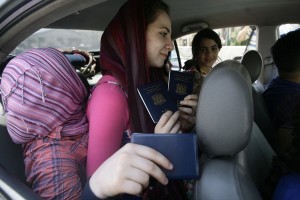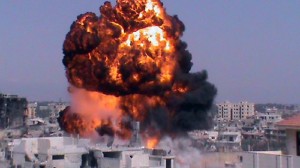 MASNAA, Lebanon – The latest wave of Syrians fleeing to neighboring Lebanon doesn’t always fit the image of bedraggled refugees escaping with only the clothes on their backs.
MASNAA, Lebanon – The latest wave of Syrians fleeing to neighboring Lebanon doesn’t always fit the image of bedraggled refugees escaping with only the clothes on their backs.
Some arrive in style to this Lebanese border post, barely an hour’s drive from Damascus, pulling up in air-conditioned SUVs, accompanied by entourages of domestic workers. Others, less well-to-do, cross by foot in the sweltering daytime heat, lugging blankets and belongings in their hands.
The numbers surged last week following intense clashes in the capital and the brazen bombing that killed four top security lieutenants of President Bashar Assad.
The flow has caused some stirrings of resentment on exile social media pages. “The sons of the rich to Beirut and the sons of the poor to the coffin,” one Syrian posted on Facebook.
Many Syrians fleeing were hesitant to speak close to the border gate, fearing the presence of Syrian secret police. Some declared they were simply on vacation.
At a nearby village, however, some newcomers opened up, though they declined to provide complete names.
 Escaping shelling and gunfire had become an unexpected and unwelcome routine for Rania, her husband, Mohammed, and their four children.
Escaping shelling and gunfire had become an unexpected and unwelcome routine for Rania, her husband, Mohammed, and their four children.
Originally from the battered opposition stronghold of Homs, the family left their home in March as shells pounded their neighborhood. Like many others from strife-ridden provinces, the family headed for Damascus, the capital, presumably a safe haven.
The family settled in a shared apartment in the northeastern suburb of Qudsaya. But government troops soon began shelling the neighborhood, said Rania, 34, who has striking features and wore a traditional long dress with matching head scarf. The shelling of Qudsaya began a month ago, she said, but it intensified last week until it reached levels the family found intolerable.
“For the past three, four days it was continued shelling,” said Rania, seated on the floor in a room in a school, turned into a hostel for fleeing Syrians, in the east of Lebanon’s Bekaa Valley. The bombardment “was in a random manner and hit shops and cars. If there is a demonstration, they’ll bomb that too.”
The conflict has turned life upside down for the couple’s 15-year-old daughter and 12-year-son. Neither has been able to attend school for more than a year.
“We just want to go back home and continue our lives,” said Rania, whose family arrived in Masnaa on Saturday. “We don’t care what kind of government it is, as long as it’s just to the people and not unjust like this one.”
In a nearby mosque, a middle-class Damascus family had sought refuge with others from the capital. Much of the extended family was here, including a mother and her daughters, a maternal grandmother and grandfather, and others. Everyone was afraid to give their names. Syrian spies are everywhere, they said. For this quintessentially middle-class Damascene family, there was a sense of shock and disbelief about what is happening in their city.
The mother, an elegantly dressed woman in her late 40s with a white head scarf and well-manicured nails, saw a certain irony in the family’s predicament. In recent months, many Syrians from hard-hit provinces had relocated to their Damascus neighborhood.
“Now,” she said, “we ourselves are refugees.”
The maternal grandmother, in her late 70s and dressed in a green and yellow gown, spoke with tears in her eyes about the last harrowing days in the Kfar Souseh district of western Damascus, site of fierce clashes. “The last three days it was becoming unbearable because they were bombing with helicopters,” she said in a fragile voice.
The woman in the white head scarf recalled how the family spent their final sleepless days in the capital in a basement as shells exploded nearby. Then they made the nerve-racking break for Lebanon.
“As we were leaving Friday, snipers fired two shots at our car,” she said. “They just shoot randomly at anyone and even burn the trees so you can’t hide behind them.”
She wants to take her family to the United States, where her son resides, or perhaps to Egypt or Saudi Arabia. “The ones who have the means will all leave at this point,” she said.
“Of course, it’s the beginning of the end, but we can’t say how long it will take,” she added. “It’s the final battle.”
LA Times

Leave a Reply
You must be logged in to post a comment.